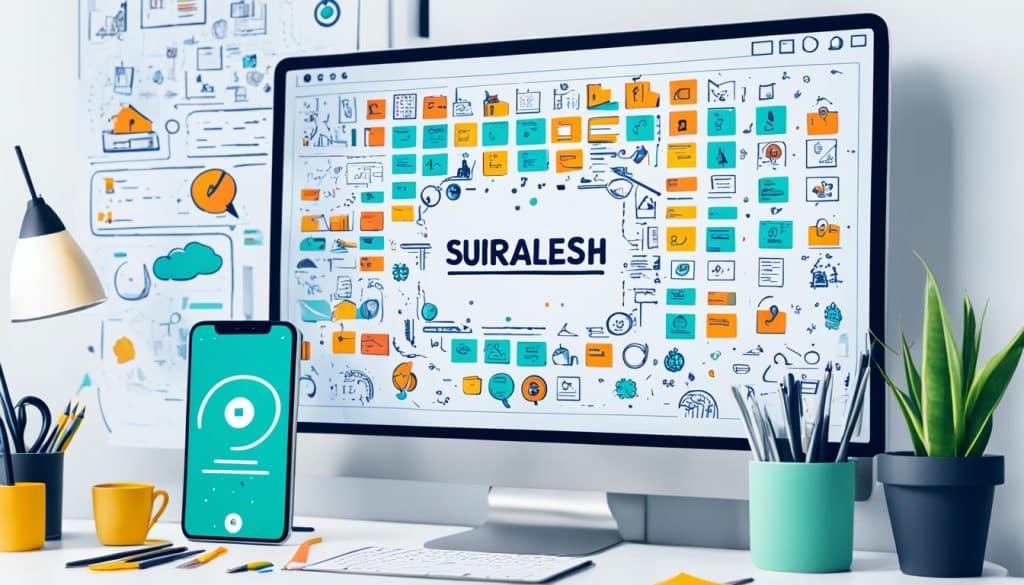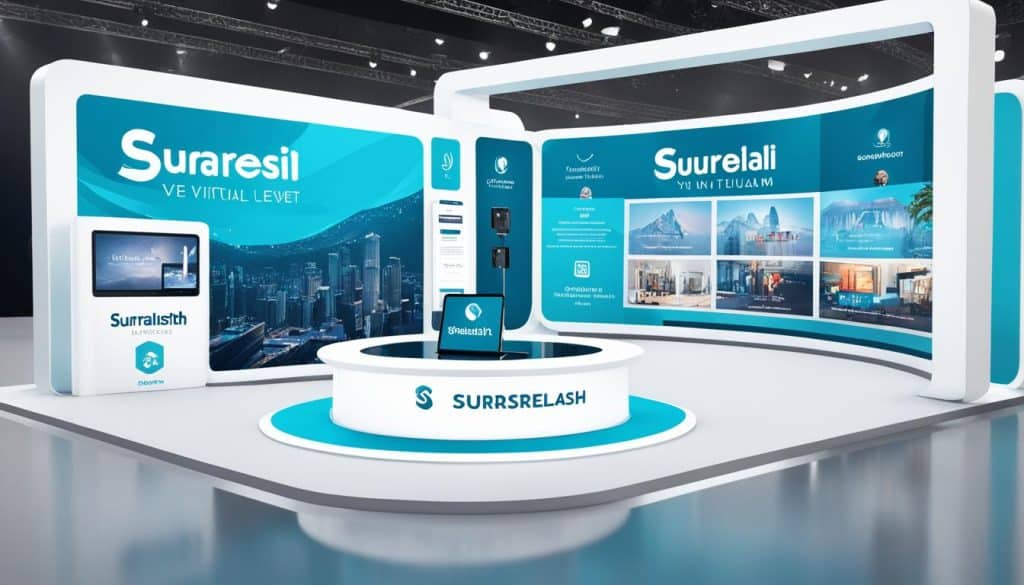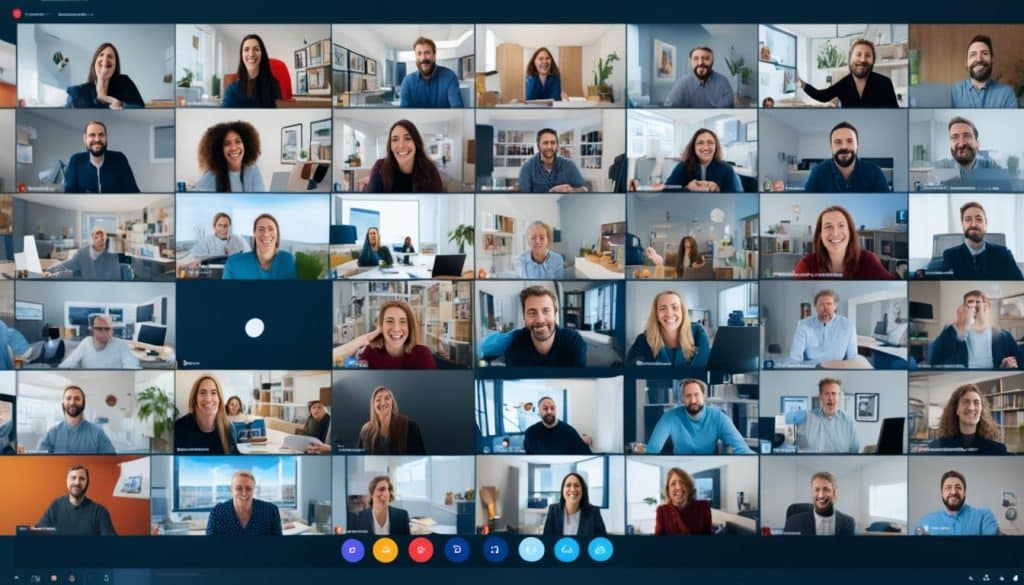The COVID-19 pandemic has changed the event planning world fast. It made a quick shift to the online world. Social distancing and limits on big gatherings became the norm. Event planners had to adapt quickly for their clients and guests.
Event planners have shown great resilience and creativity. They’ve found new ways to give virtual events that feel real. Now, the online world is full of virtual meetings, conferences, and trade shows.
Platforms like Zoom have helped planners make virtual events feel like the real thing. Zoom’s easy-to-use features and wide reach have made it key for bringing people together from all over.
But Zoom isn’t the only choice for online events. Planners are also looking at Microsoft Teams, Google Meet, and Cisco Webex. These options help meet different needs and preferences.
The way event planning works has changed a lot online. Now, planners must think about tech setup, internet speed, and keeping attendees engaged online.
Key Takeaways:
- Event planners have swiftly adapted to the online sphere due to the COVID-19 pandemic.
- The rise of platforms like Zoom has enabled the replication of in-person events virtually.
- Event planners are exploring various options for live streaming events to cater to client preferences.
- The event planning process has been transformed to include technical considerations and attendee engagement in the virtual environment.
The Rise of Virtual Meetings with Zoom
Virtual meetings are now key in modern event planning. Zoom has changed how we connect online. It’s easy to use and has powerful features, making it the top choice for virtual meetings and events.
Zoom lets people talk and see each other in real-time, making it feel like you’re all in the same room. It works for small team meetings or big conferences. Zoom can handle events of all sizes.
Zoom’s breakout rooms are a big hit. They let people talk in smaller groups. This is great for team-building, brainstorming, or workshops. It adds a personal touch to online meetings.
Sharing screens on Zoom is easy. You can show slides, demo software, or any visual idea. Everyone can see what you’re sharing clearly.
Both hosts and attendees need a Zoom account and the app to join meetings. This makes joining smooth and secure. But, Zoom has limits on how many can join and how long meetings can last. It’s best for small to medium events.
Virtual meetings are getting more popular. Using platforms like Zoom lets event planners create fun and interactive events. Zoom is a great choice for bringing people together, whether it’s for a team meeting, conference, or event.
Start using virtual meetings with Zoom by signing up for an account. It opens up new ways to connect with others online.
Exploring Other Live Streaming Options
Zoom is great for small events like team meetings and webinars. But for big virtual events, you might need something more. It’s key to look at other live streaming options that handle more people and offer strong features.
YouTube Live is a good choice for big events. It lets you stream to many people without worrying about limits. Plus, it has live chat for audience interaction.
Twitch is another option for big events, even though it’s mostly for gaming. It now hosts various live events. Twitch has live chat, emotes, and ways to make money from your event.
IBM Cloud Video (formerly Ustream) is great for advanced features and customization. It’s a pro streaming platform for big events with top-notch video and audio. It also has Q&A sessions and audience analytics.
Facebook Live is good for reaching lots of people. It has a huge user base and tools like comments, reactions, and sharing. Streaming your event here can boost engagement.
When picking a live streaming option for your big event, think about what each platform offers. Your event’s goals and needs might make one platform better than another.
Adapting the Event Planning Process for the Online World

Event planners have had to adjust their ways to fit the online world. They now look for virtual event platforms and work with online vendors. They also think about internet speed, how people sign up online, and making sure the event is fun online.
Thinking differently is key for event planners in the online world. Virtual events have opened up new ways to connect with people. They can now offer unique experiences to more people than ever before.
Choosing the right virtual event platforms is important. These platforms help host events online with features like live streaming and chats. Event planners must pick platforms that meet their event’s needs and deliver a smooth online experience.
Working with online vendors is also crucial. Event planners need to work with companies that provide everything from event production to online sign-ups. Good communication is key to avoid technical problems and make the event memorable.
Reimagining event layouts is a fun challenge for online event planners. They must create a single online space that includes everything from websites to virtual stages. By using technology and creativity, they can give attendees a unique online experience.
The online world brings new challenges to event planning. Making sure the internet works well is vital for smooth streaming and keeping people engaged. Event planners must plan for internet issues and know how to handle them. They also need to make sure people can easily sign up online.
Keeping attendees interested is key in the online world. This means adding things like live Q&A, virtual networking rooms, and games. By using these tools, event planners can make sure the event is engaging and memorable.
Adapting to the online world is an ongoing process for event planners. They need to keep up with new trends and technologies. By embracing these changes, they can create amazing virtual events that leave a mark on everyone who attends.
Leveraging Social Media for Event Promotion
Social media is key for promoting events today. Platforms like Facebook, Instagram, and LinkedIn let event planners use targeted ads, share content, and stream live to reach more people. This helps create excitement for virtual events.
Using social media, event planners can talk directly to attendees. Sharing updates and behind-the-scenes looks builds excitement and a community feel. This can increase attendance and get more people talking about the event.
It’s important to make content that grabs the audience’s attention. This means using great visuals, videos, and discussions that match what people are interested in. By doing this, events become something people really want to go to.
Social media also gives useful data to help plan promotions. By looking at how people interact with posts, event planners can see what works best. This helps them make their promotions better over time.
Working with influencers is another way to use social media for events. Partnering with influencers who match the event’s audience can spread the word and build trust. They can talk about the event, make people excited, and bring in more attendees.
In summary, social media is vital for promoting events online. By using social media well, event planners can connect with people, make a buzz, and get more people to know about their events. Using great content, looking at data, and working with influencers are key to success.
Innovating with Virtual Event Technology

The shift to online has led to new ideas in virtual event tech. Event planners now use VR, AR, and live streams to make events better. These tools make virtual events more real and fun for everyone.
VR has changed how people join virtual events. With VR headsets, people can walk through virtual places, touch 3D objects, and meet others online. It makes virtual events more engaging and fun.
AR adds virtual stuff to the real world. Event planners use AR to show more info, like product details or speaker info, on people’s devices. This makes virtual events more exciting.
Live streams are key in virtual events now. They let people talk to each other in real time. Attendees can ask questions, vote in polls, and chat with others. This builds a sense of community.
Enhancing the Attendee Experience
Thanks to new tech, virtual events can now offer unique experiences. Event planners can use customizable avatars, virtual booths, and games. Attendees can explore, check out booths, and get rewards for joining in.
These new tech tools help businesses reach their audience even when they can’t meet in person. VR, AR, and live streams make events feel like they’re happening in real life. This makes sure people remember the event.
Overcoming Challenges in the Virtual Event Space
Virtual events bring people together in new ways, but they also come with challenges. Event planners must tackle these issues to make their events memorable.
Ensuring Reliable Internet Connectivity
Reliable internet is crucial for virtual events. Planners must ensure everyone has a stable connection. They can do this by working with internet providers and having backup plans ready for technical issues.
Managing Attendee Registration and Login Processes
Handling registration and login can be tricky in virtual events. Planners should make signing up easy and ensure only authorized people can join. This keeps the event safe and exclusive.
Maintaining Audience Engagement Throughout the Event
Keeping people interested is hard without being in the same room. Planners use interactive tools like polls and Q&A to keep everyone engaged. This helps build a community feel among attendees.
Event planners use their creativity and tech skills to overcome these challenges. They ensure everyone can connect reliably, manage sign-ups smoothly, and keep the audience hooked. This way, they make virtual events engaging and memorable.
The Importance of Event Production Managers in the Online World
Event production managers are key to making virtual events a success. As more events move online, their skills are more crucial than ever. They use their knowledge and skills to make events smooth and engaging for everyone.
They handle the planning and execution of virtual events. This includes everything from arranging logistics to managing tech. Their focus on details makes sure everything, from sound to streaming, works perfectly.
These managers know all about the latest in virtual event tech. They use this knowledge to improve the event experience. By using interactive tools, they keep attendees interested and excited.
They’re also great at fixing technical problems during events. Their quick thinking means any issues are quickly sorted out. This keeps the event running smoothly and attendees happy.
Event production managers are also excellent at working with others. They work with planners, presenters, and tech teams. They make sure everyone is on the same page, creating a smooth event experience.
So, when you enjoy a virtual event without a hitch, remember, event production managers made it happen.
Key takeaways:
- Event production managers are essential for the success of virtual events in the online world.
- Their expertise in virtual event technology and production ensures a seamless and professional experience for attendees.
- They play a crucial role in coordinating logistics, managing technical aspects, and troubleshooting issues during live events.
- Event production managers have strong communication and collaboration skills, facilitating effective coordination with event planners and technical teams.
Embracing Hybrid Events for the Future
Event planners are turning to hybrid events as a new way to connect people. These events mix online and in-person elements. This approach makes events more flexible and welcoming for everyone.
Hybrid events are becoming popular as we slowly return to in-person events. They blend virtual and physical parts. This lets planners adjust to new rules while keeping the good parts of online events.
Hybrid events let organizers share their events with more people. By using online tools like live streams and interactive platforms, people can join from anywhere. This means more people can take part and enjoy the event’s content and networking.
With hybrid events, people can pick how they want to join in. They can be there in person or online. This makes the event more flexible and appealing to a wider audience.
Hybrid events also help event planners make more money. They can sell tickets, get sponsorships, and offer online exhibition spaces. This makes hybrid events a smart choice for the future of events.
Looking ahead, hybrid events will be great for both planners and attendees. They combine the ease of online events with the fun of being together in person. This gives everyone the best of both worlds.
So, as we look to the future, hybrid events will be a big part of event planning. They offer a way to make events that are inclusive and engaging for everyone.
The Power of Data and Analytics in Virtual Events

Virtual events have changed how we meet and connect. They offer new chances for event planners to use data analytics. By looking at the data from these events, planners can learn about what attendees like and how they engage. This helps them make better decisions, improve events, and host impactful virtual events.
Virtual events give planners a lot of data to work with. They can look at who signed up, who came, and how people interacted with sessions. This info helps planners understand what their audience likes and does.
With data analytics, planners can see which parts of an event people liked most. This lets them plan future events that match what people want. This makes people happier and more involved.
Data analytics also helps planners spot trends and patterns. By looking at who came and what they liked, planners can make their events better. They can make sure the content and marketing hit the mark.
Also, data analytics shows how well different parts of an event work. Planners can see how many people connected, chatted, and went to sessions. This helps them pick the best tools and platforms for their events.
Using data analytics in planning virtual events boosts the event’s return on investment. By looking at who signed up, who came, and how happy people were, planners can improve. This makes events better for attendees and helps meet goals.
Virtual events offer a big chance to use data and analytics well. By using data, planners can make events more personal, get people more involved, and make more money. As virtual events grow, using data analytics will be key to their success.
The Growing Demand for Virtual Event Professionals
The move to virtual events has made the need for virtual event professionals much higher. These experts are great at planning and managing online events. They use their skills in virtual event tech, keeping people engaged online, and making sure everything runs smoothly.
With the COVID-19 pandemic still affecting us, virtual events are now the top choice for reaching out to people. This has made it clear that we need professionals who can make these events work well. They must be able to plan, carry out, and deliver top-notch virtual events.
Virtual event pros know the ins and outs of online events. They’re up to speed with the newest tools and platforms. This lets them make events that are fun and keep people interested.
These experts also know how to keep people involved and talking to each other online. They use live chats, Q&A sessions, and polls to make sure everyone feels part of the event.
Virtual events are great for getting important data and insights. Professionals use this info to see how well events are doing and to make them better for the future. This way, every event gets better and gives attendees the best experience possible.
The virtual event world is getting bigger, and so is the need for skilled people in this area. Companies see how valuable and effective virtual events can be for their goals. They’re counting on virtual event pros to lead the way in this new area.
Working with virtual event pros means your events will run smoothly and be fun for everyone. They’re experts in making sure virtual events, like conferences, trade shows, or networking events, meet their goals. Their knowledge and skills are key to success.
Ensuring Safety and Security in the Online Event Space
With more events moving online, it’s vital for planners to focus on safety and security. They must make sure the online space is trustworthy and safe for everyone. This means taking strong steps to protect sensitive info and keep out unwanted guests.
Secure registration is a key part of keeping online events safe. Using encrypted forms helps protect the personal details of attendees. This not only keeps their data safe but also makes them trust the event more.
Keeping online events secure means using encrypted ways to talk to each other. This stops hackers from getting into private chats. With end-to-end encryption, what’s said in the online sessions stays private.
It’s also important to have clear rules for online events. Event planners should tell everyone what’s expected of them. This includes how to keep safe online and respect others.
Monitoring and Moderation
Having people to watch over the online event is key to keeping it safe. Moderators can quickly deal with any security issues. They make sure everyone is safe by watching what’s being said and stopping bad behavior.
Securing Access and Data Management
Keeping online events safe means making sure only the right people get in. This can be done with special codes or passwords. Only those who signed up can join the event.
Handling data well is also crucial. Event planners should keep all information safe and follow strict rules. This helps avoid data breaches and keeps private info out of the wrong hands.
In the end, making online events safe and secure is very important. By using secure sign-ups, encrypted chats, good monitoring, and safe data handling, planners can make a safe space. This builds trust and makes the event a success.
The Role of Innovation and Creativity in Virtual Event Planning

Planning virtual events needs a lot of innovation and creativity. Event planners must find new ways to keep attendees interested and make the event memorable. They need to use virtual event technology in creative ways to make the event a success.
Unleash your Creativity
To make virtual events stand out, planners should try new ideas. Using interactive elements, immersive visuals, and engaging stories can make the event better. Trying out formats like gamification or virtual reality can make the event more fun and memorable.
When planning an online event, think of new ways to interact with attendees. Use interactive polls, live Q&A, and breakout rooms to get people involved. Adding dynamic virtual settings that feel like real events can also help. This could be through stunning visuals, live shows, or even personalized avatars to make it more engaging.
The Power of Technology
Using technology is key to innovative virtual event planning. Look into the latest platforms, streaming tech, and tools to make the event smooth and immersive. Features like live chat, networking, and virtual booths can help with networking and business opportunities.
Technology opens up many creative possibilities for virtual events. Using AR and VR can take attendees to new worlds. Advanced analytics and data can help planners understand what attendees like, making the event better for them.
Adapting with Agility
Virtual event planning needs to be flexible and open to new ideas. Always look for ways to improve and try new things. Listen to feedback and use it to make future events better. Working together with teams, speakers, sponsors, and attendees can bring new ideas to the table.
In conclusion, making virtual events great requires a lot of innovation and creativity. By thinking differently, using technology, and being open to change, planners can create events that really grab the audience’s attention.
The Future of Event Planning in the Online Sphere
The move to the online world has changed event planning for the better. Virtual events are now a big hit, offering easy access and flexibility. They will keep playing a big part in event planning, bringing new ways to engage with people.
As tech gets better and more people go online, the future of event planning will be shaped by the internet. Virtual events let organizers reach people all over the world. This means they can create events that are diverse and include everyone.
The online world also lets event planners track how well events do in real-time. They can use this data to see what works and what doesn’t. This helps them plan better for the future, making sure their events are top-notch.
Also, the online sphere is a goldmine for promoting events. With social media and online ads, event planners can spread the word far and wide. Social media stars and digital campaigns can make virtual events more popular.
Embracing Hybrid Events for the Future
Looking forward, we might see more hybrid events. These mix in-person and online elements together. Hybrid events let people at the event connect with a global audience, making events more engaging for everyone.
Hybrid events are great for meeting different needs and changing situations. They’re perfect when travel is hard, there’s a limit on how many can attend, or people prefer to join in online. This flexibility will be key in the future, helping events switch between in-person and online smoothly.
Embracing Virtual Event Planning with Confidence
Event planners who confidently adapt to virtual event planning are set for success online. In our fast-changing world, being able to quickly adapt and use virtual events is key. This skill keeps them ahead.
Staying updated with new virtual event tech opens up exciting chances for planners. They can create deep experiences for guests. The world of virtual events is always changing, full of new ways to be creative and engage people.
Event planners should feel confident in their ability to make a mark with virtual events. They should keep learning new ways to engage online. This way, they can keep up with changes and give attendees memorable virtual experiences.
















